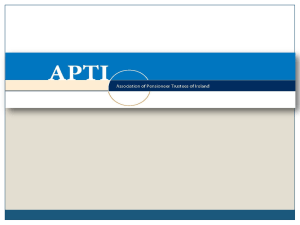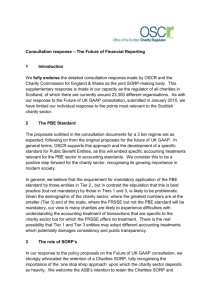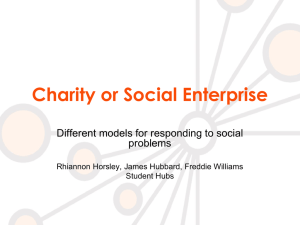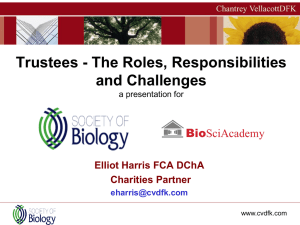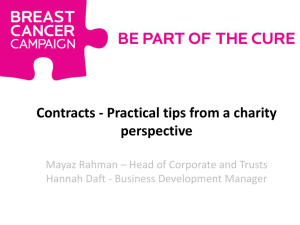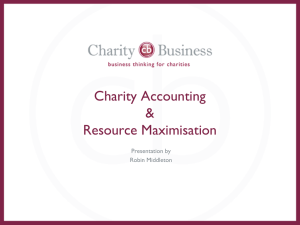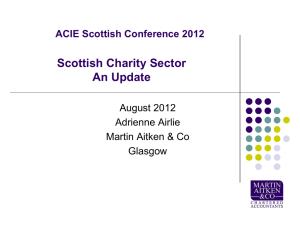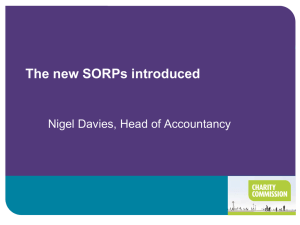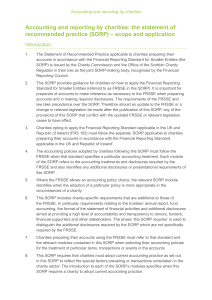aSORP Consult. - Sheila Nordon
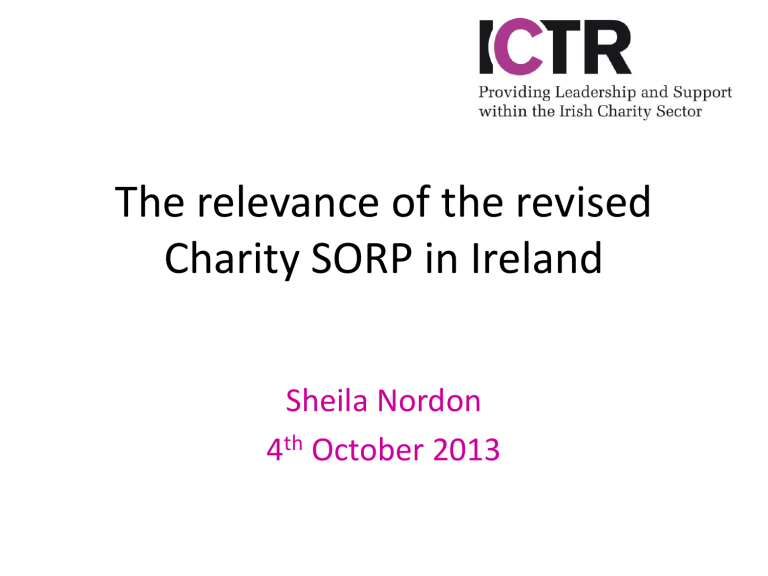
The relevance of the revised
Charity SORP in Ireland
Sheila Nordon
4
th
October 2013
Charity Sector in Ireland – some facts
Est. 24,000 non profit organisations of which
8,342 currently qualify for charitable tax exemption
(automatic registration under Charities Act 2009)
• 52% incorporated (mostly companies ltd by guarantee)
• 28% unincorporated associations
• 18% trusts
• 2% other
Not known how many more will apply for/qualify as charities under new Act
Small number of medium to large charities and very large number of small charities – proportionality a key issue.
What charities is SORP relevant to?
Top 10%
• Annual Income above €740K
50%
• Annual Income of
€40K or below
Bottom 10%
• Annual Income of less than €1,300
Attractions of the Charity SORP
It is appropriate to the needs of charities and accessible to those preparing and interpreting charity accounts (often not professional accountants e.g. donors)
It takes into account the specific differences between charities and commercial enterprises
It recognises the importance of narrative reporting for charities as well as financial reports
It provides a consistent reporting framework that allows for valid comparisons between charities in different sectors
It has been developed over years based on extensive research and consultation and takes into account the findings of the most recent review process
It is based on the principle of proportionality where small charities are concerned – different requirements depending on scale
It helps charities to demonstrate transparency and accountability to the public
The Status of the Charity SORP in
Ireland
The Charity SORP is recommended as Best Practice and is voluntary in Ireland – why is it different here?
we don’t yet have a regulatory authority like the Charity Commission in
England and Wales or the Office of the Scottish Charity Regulator in Scotland who are the FRC approved “industry” bodies that developed the SORP but we will soon – the CRA
the Charities Act 2009 does not require compliance with the SORP – the equivalent legislation in Scotland, England and Wales does. The proposed regulations on financial reporting could conceivably change this over time and following appropriate consultation
there is no formal mechanism in place for the regulatory authorities in Ireland to feed into the development of the SORP but there is a precedent in relation to the “Pensions” SORP where the Irish Pensions Board (the statutory regulatory authority) has made it a requirement and is formally linked into the
Pensions SORP making body.
So why is the Charity SORP relevant to Irish Charities you might ask?
Donors are least satisfied with understanding impact and seeing finances
Not important to me Very dissatisfied Slightly dissatisfied Neither satisfied nor dissatisfied Moderately satisfied Very satisfied
The experience overall 42% 31%
Feeling reassured that the charity is a good one to support
Being able to support a specific project or campaign the charity runs that interests you
Knowing that the charity spends its money effectively
Being appropriately thanked for your donation
Understanding what difference your contribution makes
Receiving feedback on how your donation was used and what this achieved
33%
34%
31%
41%
33%
33%
26%
34%
30%
28%
21% 19%
Getting information on the charity's finances 20% 14%
-100% -80% -60% -40% -20% 0% 20% 40% 60% 80% 100%
“Thinking about the last time you made a donation to charity that was significant to you, how satisfied were you with the different aspects of the experience”
Base: Recent charity donors who answered each statement (approx 700 Jun 06, 768 Apr/May 13, 919 Apr/May 13) adults 16+, Britain.
Source: Charity Awareness Monitor, Apr/May 2013, nfpSynergy
Why is it relevant in Ireland?
• Public are least satisfied with understanding impact and seeing charity finances (based on public polling research)
• The Charity SORP has been specifically designed to provide accessible information for users of charity accounts and it is tried and tested
• Applying the new FRS102 standard for Public Benefit Entities (which is mandatory) without the benefit of the SORP interpretation and guidance would be like flying on one wing
• The Charities Act 2009 already requires a narrative Activity Report from every charity – is it likely to be that different to the Trustees
Annual Report as per the SORP?
• The Charities Act 2009 also provides for more detailed regulation on Charity Reporting following consultation with the sector. First round of consultation last March reveals strong support for the
Charity SORP.
• One thing for sure – whatever emerges from the process will require charities giving more information than is currently provided by statutory accounts and company law
Implications for reporting format
If not the Charity SORP then what?
Are we going to start from scratch in Ireland?
If we do?
To ensure consistency of reporting by charities the Annual
Activity Report would have to include levels of financial detail not currently required in Annual Returns/Financial
Statements under Company Law e.g. Fundraising, sources of income etc. (to be specified by regulation under Charity
Law)
Makes more sense to adopt the internationally recognised Charity SORP specially designed for charities adopting accruals accounting (which would apply to charity companies and non-companies alike) and develop a simpler reporting format for small charities similar to Scotland.
This is your chance to have your views on the new SORP heard
Take it!
Closing date for submissions is
4
th


